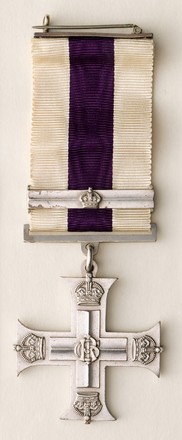
Military Cross and Bar
awarded to Lt Joseph Maxwell, 1918
silver with silk moiré grosgrain ribbon
Bequest of Sir William Dixson, 1952
DN / M 1287
silver with silk moiré grosgrain ribbon
Bequest of Sir William Dixson, 1952
DN / M 1287
An apprenticed boiler-maker from the Sydney suburb of Annandale, Joseph Maxwell enlisted in February 1915 aged 18 years. He was posted to the 18th Battalion, serving at Gallipoli and the Western Front. On the Western Front, he was awarded the Distinguished Conduct Medal, the Military Cross and Bar and the Victoria Cross. He was only 22 when the war ended.
By 1934 Maxwell was out of work. Struggling to make ends meet, he sold his Distinguished Conduct Medal and Military Cross and Bar to Sir William Dixson. These medals came into the State Library’s collection as part of Dixson’s bequest in 1952. Maxwell’s Victoria Cross is currently at the Australian War Memorial, on loan from the Victoria Barracks Museum in Paddington.


 Back to list
Back to list